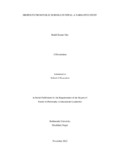
Please use this identifier to cite or link to this item:
https://hdl.handle.net/20.500.14301/291| Title: | DROPOUTS FROM PUBLIC SCHOOLS IN NEPAL: A NARRATIVE STUDY |
| Authors: | Gho, Buddi Kumar |
| Citation: | Gho,B.K. Dropouts from Public Schools in Nepal: A Narrative Study . |
| Issue Date: | Nov-2022 |
| Publisher: | School of Education |
| School: | SOED |
| Department: | DOEL |
| Level: | M.Phil. |
| Program: | MPhil in Educational Leadership |
| Abstract: | Dropout from public schools is still a serious problem in Nepal. It leads the growing youths towards an uncertain future. There are various causes for dropout. Many programs are applied to stop dropouts, but the result is quite disappointing. For this research, four participants, who dropped out from the public schools of Madhyapur Thimi, Bhaktapur were purposively selected. The research explored the participants' lived experiences on the causes and consequences of dropouts. As ontology tells truth with multiple realities, I have put my ontology based on people's socio-economic perspectives. No knowledge is independent of the knower and I have dedicated myself to making the study meaningful in regard to axiology. I have adopted narrative inquiry as a research design using semi-structure interviews and field notes as information- generating tools. The experiences they have shared are transcribed and narrated in the form of a bundle of stories. Initially, the participating students were fond of studying in their early grades. Each of them has their aim and goal in life. As they reached higher grades, the situation was out of their control. They had to drop out of their respective schools due to different factors as the bitter truth. It is found that family difficulties, poor economy, social responsibility, and parental carelessness are the main causes of dropouts. They had to drop out because they could not manage time for their family responsibility. This study also explored various consequences of dropout. The participants experienced low social status in employment and their community. Besides, they could not feel high prestige compared to those with higher educational qualifications. Similarly, in the study, the participants were found unhappy due to their dropout with feelings of regret to some extent. They feel that they never get the status as equal to educated persons, even if how much money they earn. They could contribute more if they had higher education degrees, and their family status would be better than they have now. They often feel an inferiority complex at social gatherings and other junctures. It revealed the fact of students reportedly dropping out of public school without completing their education. Thinking over the research questions, it is concluded that the participants dropped out from their respective schools and grades due to various causes. This study shows that the causes of dropouts vary from participant to participant and their experiences on consequence were quite different from each other. However, the results of this study suggest that educators foster a friendly and supportive environment in classrooms. I assume this research would be useful to those who want to have further research in this regard and to the stakeholders to set a policy for reducing dropouts. |
| URI: | https://hdl.handle.net/20.500.14301/291 |
| Appears in Collections: | Dissertation |
Files in This Item:
| File | Description | Size | Format | |
|---|---|---|---|---|
| WCC- Gho_Ready for final Print 1st May.pdf | 1.14 MB | Adobe PDF |  View/Open |
Items in DSpace are protected by copyright, with all rights reserved, unless otherwise indicated.